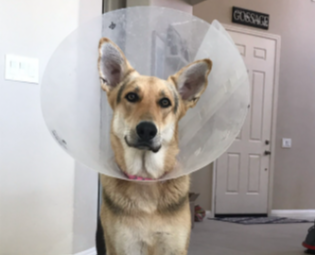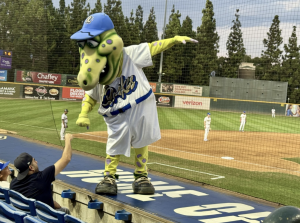Can Pets Get the Coronavirus?

There have been millions of people who have gotten COVID-19, but is there a chance your furry friends can also get this virus?
December 17, 2020
The number of adopted animals has dramatically spiked since the advent of COVID-19. But have you pondered if your furry friend could also test positive for the virus? According to local veterinarians, it is highly unlikely for your dog or cat to contract the virus, or any kind of coronavirus, for that matter. But it isn’t impossible.
“(Animals do) get coronavirus, but they rarely get the same kind that we do. (Vets) have said that some cats and dogs have gotten coronavirus but only in really, really strange cases,” said veterinarian Stephanie Ortiz from Chino Valley Equine Hospital.
According to the Centers for Disease Control and Prevention, if a pet were to acquire coronavirus, it would probably not spread to anyone in the family. However, if you were to contract coronavirus, the CDC would advise that you stay away from your pet, as there is a likelihood that animals can acquire the virus from people.
The CDC cites that “data from one study suggests some dogs can get infected, but might not spread the virus to other dogs as easily compared to cats and ferrets, which can easily spread the virus to other animals of the same species.”
Although veterinarians and scientists are not certain how animals catch and spread the virus, there have been multiple cases that remind people to be cautious. The FDA reported in mid-2020 that two cats had confirmed cases of COVID-19.
“It’s not uncommon for (pets) to show signs of respiratory distress, or have trouble breathing, and maybe coughing as well. But it’s still less likely for an animal to exhibit these signs caused by COVID-19,” said Baseline Animal Hospital’s veterinarian Mina Bolous.
According to CNN, a Snow Leopard at Louisville Zoo – NeeCee – recently tested positive for COVID-19. Additionally, two other Snow Leopards, Kimti and Meru, have exhibited respiratory problems and the zoo is waiting for their COVID-19 testing results. Meanwhile, their staff are required to wear PPE (Personal Protective Equipment), check their temperature, and answer a series of questions for the safety of both the visitors and animals.
“We continue to monitor their health. Their symptoms are very mild and all three Snow Leopards are expected to recover. We are taking appropriate precautions for everyone’s safety,” said Louisville Zoo Director, John Walczak.
“We presume that NeeCee was infected by an asymptomatic staff member (because) that’s the way it usually works. Typically a human to human transmission disease occasionally spills over into animals,” said senior veterinarian Zoli Gyimesi.
Although coronavirus has been seen in animals, specifically large cats, it is rare and unlikely to fatally harm your dog or cat. However, if your pet does contract the virus you should take action quickly and cautiously.
“If (your pet) is seeing any signs of (coronavirus), take them into a veterinary clinic and have them examined by a vet and, to their best knowledge, they can come up with a treatment and a diagnostic for that pet,” says veterinarian Mina Bolous.






